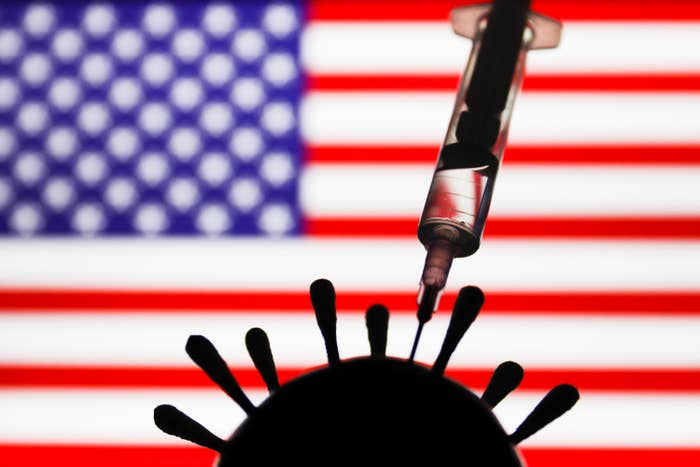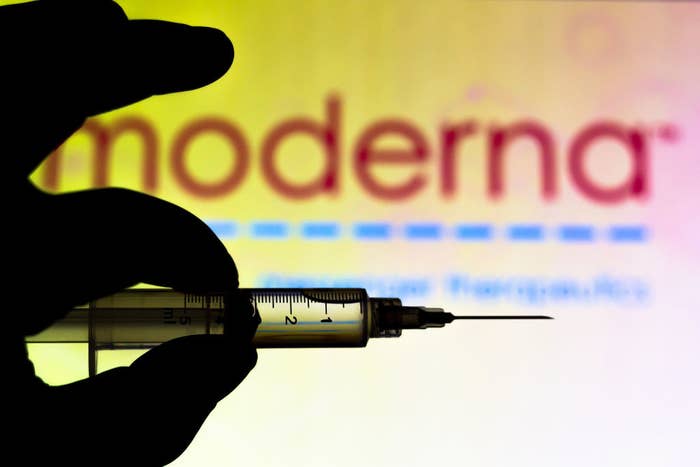
The journalists at BuzzFeed News are proud to bring you trustworthy and relevant reporting about the coronavirus. To help keep this news free, become a member and sign up for our newsletter, Incoming.
The pharmaceutical company Moderna announced extremely promising early results from its coronavirus vaccine trial on Monday, adding a second vaccine to the mix of coming protective shots for the deadly pandemic as cases surge worldwide.
The company, which designed its vaccine at the urging of National Institute of Allergy and Infectious Diseases chief Anthony Fauci in the first months of the pandemic, is the second to report late-stage coronavirus vaccine trial results, after Pfizer's promising early data last week. The results, which — like Pfizer's — did not include the actual data from their trial and have yet to be peer-reviewed, suggested that people who received the vaccine's two shots four weeks apart experienced 94.5% fewer cases of COVID-19 compared to those who received placebo injections. The company said side effects were minor, including sore arms, headaches, fatigue, and fever, all of which subsided soon after the shot.
The preliminary analysis is based on just 95 patients who developed COVID-19 in Moderna's trial, which has enrolled 30,000 patients. Ninety of these patients were in the placebo group, while five had received the vaccine. Notably, the company reported that 11 participants developed severe COVID-19, all of whom were in the placebo group.
The efficacy numbers are expected to change as the trial continues to collect more data. The early analysis of the trial's data was conducted by an independent data safety monitoring board appointed by the National Institutes of Health.
The extremely high level of protection is surprising news after months of researchers cautioning that early coronavirus vaccines may not offer a high level of protection. The FDA only requires that a vaccine needs to be at least 50% effective in preventing illness. The yearly flu vaccine is typically between 40% to 60% effective at preventing infections.
"It’s remarkable actually," said Paul Offit, a vaccine expert at Children’s Hospital of Philadelphia, who sits on the FDA vaccine advisory committee. Offit noted that it was especially promising to see the vaccine be effective at preventing severe disease, since that carries the highest risk of death.
"Many of you remember. I said I would be satisfied with a 70% to 75% efficacy. Something like a 95% was aspirational. Well, our aspirations have been met, and that is very good news," Fauci said at an NIH press conference discussing the results.
"The vaccine that we are talking about and vaccines to come are really the light at the end of the tunnel. It is help that I’ve said is on the way," Fauci said, warning that people should continue to wear masks, socially distance, and wash their hands. "We should not let the accomplishment of an effective vaccine have us feel we should let our guard down. It should be an incentive to double down."

The pandemic has caused more than 54 million COVID-19 cases and killed more than 1.3 million people worldwide, with more than 246,000 of the deaths in the US. Cases are now surging across the US, killing more than 1,400 people a day. More than 1 million new cases of COVID-19 were reported in the US last week.
Twelve vaccines are currently in late-stage trials worldwide, with four frontrunners including Moderna's sponsored by the federally funded Operation Warp Speed (OWS). Pfizer reported last week its vaccine was more than 90% effective in blocking infections, following cases seen among 94 patients in its clinical trial. Unlike Moderna, Pfizer did not report how many of the cases were in the placebo group or how many of the cases went on to develop severe illness.
Pfizer last week sought to put distance between its coronavirus trial and the Trump administration, telling the New York Times that it did not receive any research or development funding from OWS. The pharmaceutical company does have a $1.95 billion advanced purchase agreement with OWS to distribute the vaccine in the US.
The November results, and likely requests this month for emergency authorization to start to distribute limited amounts of vaccines, come after an unprecedented sprint for coronavirus vaccine development worldwide. Vaccines typically take years to develop and test.
The early results follow a bitter election, as President-elect Joe Biden clinched the presidency. President Donald Trump subsequently complained that vaccine makers had held up their results until after the election, a claim dismissed by Pfizer.
The drug companies said they will keep collecting safety data required by the FDA, which says that half of the patients in the trial should be monitored for side effects for at least two months following their second shot, before asking the agency for emergency authorization to begin distributing its vaccine. Moderna expects to meet that milestone in the coming weeks.
Once that data is collected, Moderna said it has nearly 20 million vaccine doses ready to ship in the US by the end of 2020 and will produce up to 1 billion doses worldwide in 2021.
Experts have cautioned that knowing more about whether the vaccines prevent severe illness and asymptomatic infections remain important questions. Since the vaccines are only months into their clinical trials, it is still not known how long they can prevent infection with the virus.
The Moderna and Pfizer vaccines belong to a new class of messenger RNA (mRNA) gene injections, a type of vaccine never approved before for use in people. They carry genes that instruct human cells to make viral proteins, triggering the body's immune response.
"It’s phenomenal," Offit said. "We don’t have any commercial experience with an mRNA strategy. They both found essentially the same outcome — with different researchers, different study sites, different constructs, different doses. That just makes you feel much better about the Pfizer data."
An advantage of the Moderna vaccine is that it only requires freezing at -4 degrees Fahrenheit, safe for conventional freezers, for up to 30 days. Pfizer last week said it would distribute the two-shot vaccine independently of the US government, from distribution centers in Michigan and Belgium. Its shots require storage at -94 degrees Fahrenheit, however, necessitating transport in dry ice and storage in specialized "ultra low temperature" refrigerators.
FDA officials have indicated they would schedule a meeting of the vaccine advisory board of external experts who vote to recommend new vaccines once a pharmaceutical company requests emergency authorization to distribute its shots to the public. Those meetings usually come 15 days after the agency places a notice in the Federal Register.
UPDATE
This story has been updated with more information about Operation Warp Speed.
UPDATE
This story has been updated to include information from an NIH press conference on Monday morning.

